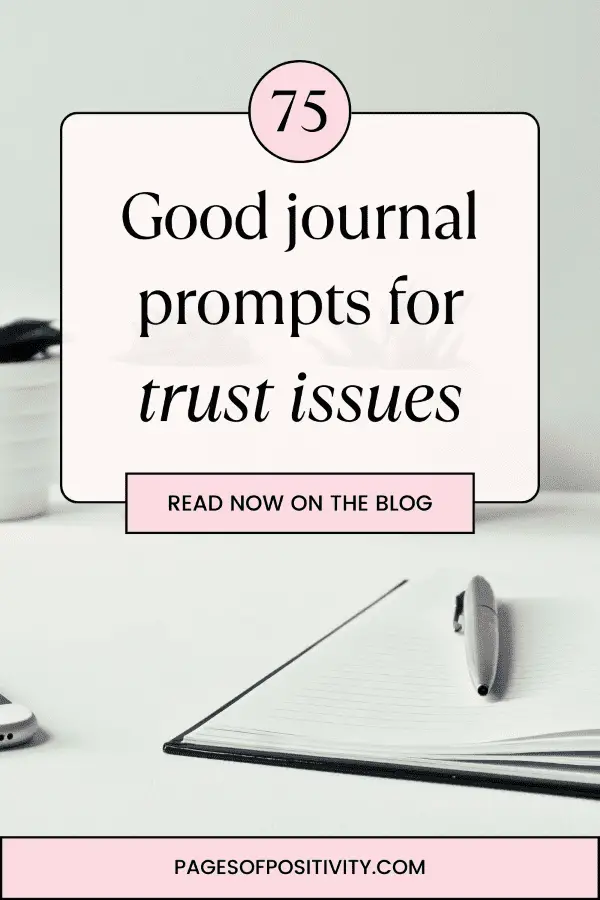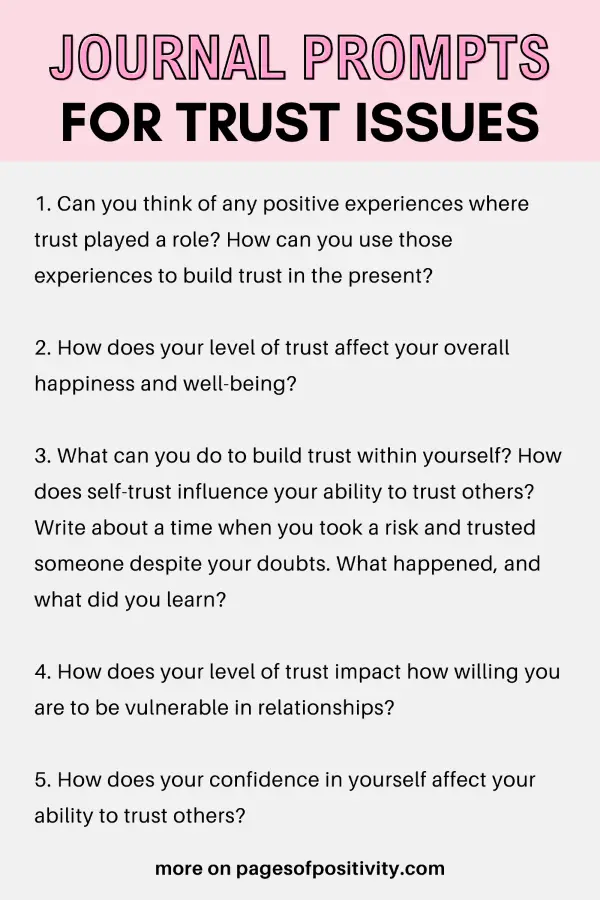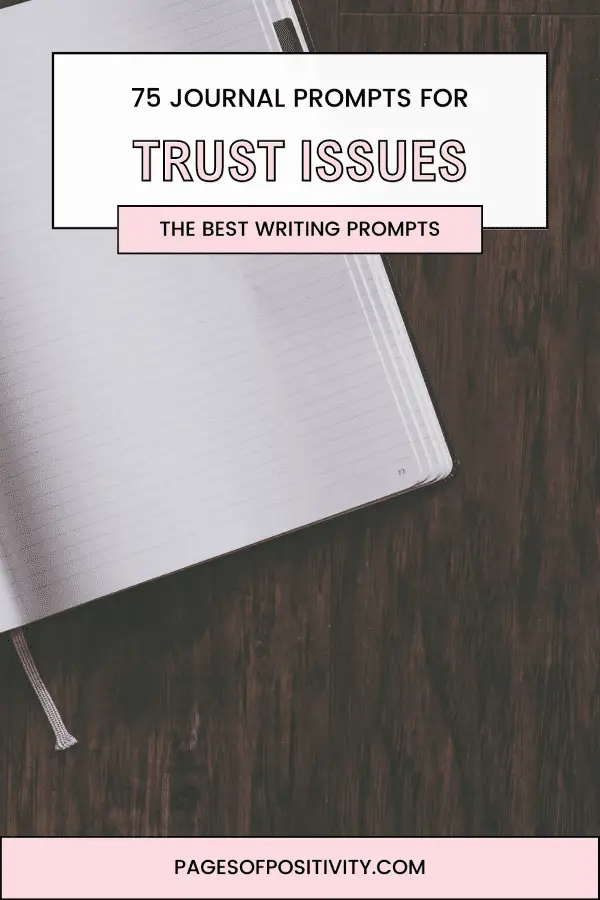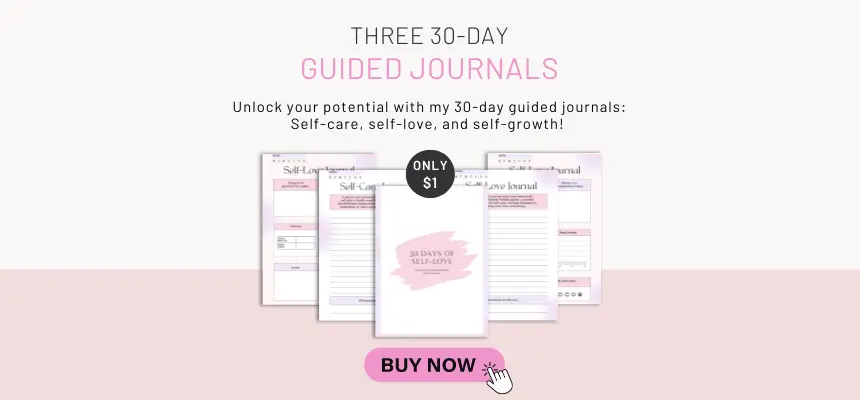Shadow journaling prompts for healing from trust issues
If you’re here to see journal prompts for trust issues, you’re in the right place.
Trust is important in relationships, but past experiences can make it hard to trust again. We’ll discover how journaling can help heal trust issues.
Journaling provides a safe and private space to think and reflect. It helps you be kind to yourself and rebuild trust in a strong and authentic way.
By using journal prompts for trust issues, we’ll dig deep into your feelings. This will help you understand yourself and your relationships better.
Whether you’ve had trust issues in friendships, romantic relationships, or with yourself, these shadow work prompts for beginners will guide you on a healing journey.
So grab your journal, find a cozy spot, and let’s start this empowering path to healing and finding your inner strength.


This post may contain affiliate links. That is, if you click on a link and buy something I recommend, I will receive a small compensation at no additional cost to you.
75 shadow work journal prompts for trust issues
- When did you first feel like you couldn’t trust someone? Describe that moment.
- Write about a time when you trusted someone and it turned out well. How did it feel?
- List three people you trust the most. Why do you trust them?
- Have you ever betrayed someone’s trust? How did it happen, and how did you feel afterward?
- Describe a situation where your trust was broken. How did it impact you?
- Write about a time when you trusted your instincts and it paid off.
- Do you trust yourself? Why or why not?
- What are your core values, and how do they relate to trust?
- How does your family’s history of trust issues influence your own trust patterns?
- Reflect on a time you felt betrayed by a friend. How did it affect your friendship?
You might also like: The best journal prompts for anger to help you manage your anger
- Have you ever given someone a second chance after they broke your trust? What happened?
- Write about a person you don’t trust. What led to this lack of trust?
- How does past trauma affect your ability to trust in the present?
- Describe a time when someone trusted you, and you didn’t want to let them down.
- Explore how your childhood experiences shape your trust in romantic relationships.
- Write about a time when your trust was rewarded and someone exceeded your expectations.
- How does your trust (or lack of trust) impact your career and professional relationships?
- Reflect on a time you had to rebuild trust with someone. What steps did you take?
- Write about a time you felt vulnerable due to trust issues.
- Discuss the role of honesty in building and maintaining trust.
- Tell a story about a time when you trusted your gut feelings and they turned out to be right. How can you rely on your instincts to navigate trust in the future?
- How do your difficulties with trust make it hard for you to ask for help or support from others?
- Think about people in your life whom you consider trustworthy. What qualities do they have that you can try to develop in yourself?
- Describe a situation where you felt safe and trusted. What made you feel that way, and how can you create similar conditions in other relationships?
- Imagine a future where you have resolved your trust issues. How would that look and feel?
- How does your confidence in yourself affect your ability to trust others?
- Describe a time when you doubted someone’s trustworthiness but later realized you were wrong.
- Write about any fears or worries you have about being open in relationships. How do these fears relate to your trust issues?
- Describe a time when you had to confront someone about a breach of trust.
- Reflect on a time when you trusted someone with your dreams or aspirations.
- Write a letter to someone you find hard to trust. Express your thoughts, feelings, and wishes in a safe and respectful way.
- Reflect on the importance of setting boundaries to build trust. How can you establish and communicate your boundaries effectively in relationships?
- Describe a situation where you trusted someone who didn’t deserve it. What did you learn?
- How do your trust issues influence your perception of taking risks? Consider how the fear of being let down may limit your willingness to try new things.
- Reflect on a time when you trusted someone even when others advised against it. What happened?
- Think about any negative beliefs or thoughts you have about trust. How can you question and change these beliefs?
- Have you ever taken a risk based on trust? What was the outcome?
- Explore how cultural or societal influences affect your trust issues. How do societal rules and expectations impact your ability to trust and be trusted?
- Think about the role of forgiveness in rebuilding trust. What does forgiveness mean to you, and how can it help with healing?
- Write about any activities or exercises that help you build trust. How can you include these practices in your relationships?
- Think about finding a balance between trust and healthy skepticism. How can you be cautious without letting mistrust dominate your relationships?
- Write a letter to your future self, imagining a version of you who has healed their trust issues. Offer support and encouragement.
- Explore any resistance or fear you have about seeking professional help for your trust issues. What can you do to overcome this resistance?
- Write about the impact of social media and technology on trust in relationships. How can you handle trust issues in the digital age?
- Reflect on your personal strengths that can help you rebuild trust. How can you use these strengths to foster trust in your relationships?
- Describe a situation where someone trusted you. How did it feel to be trusted, and how did you respond?
- Write about the role of intuition in trust. How can you learn to trust your instincts when forming connections with others?
- Reflect on self-forgiveness and how it relates to trust issues. How can forgiving yourself for past mistakes help build trust in the present?
- Write down three practical steps you can take to start rebuilding trust in a specific relationship affected by your trust issues.
- Imagine being in a trusting and fulfilling relationship. What qualities, actions, and behaviors would be present? How can you show those qualities in your current relationships?
- Write about a time you felt like someone was testing your trust. What did you do?
- Describe a situation where you saw someone else rebuild trust after a betrayal. What can you learn from their experience?
- Write about any recurring dreams or nightmares you have related to trust issues. What do these dreams symbolize or communicate?
- Reflect on the idea of self-trust. How can developing strong self-trust positively impact your ability to trust others?
- Write a letter to someone who has deeply hurt your trust, but don’t send it. Use this exercise to release emotions and find closure.

- How does your level of trust in strangers differ from that of close friends?
- Reflect on a time when you trusted someone, but they didn’t trust you in return.
- Write about a time when you trusted your instincts but later realized you were wrong. How did this affect your ability to trust your intuition in the future?
- Explore how your trust issues might be connected to how you see yourself. How can you work on building a stronger sense of self to address these issues?
- Write about a time when you had to rebuild trust with a family member.
- Write about a time when you had to choose between trust and forgiveness.
- Explore any fears you have about being vulnerable in relationships. How can you find a balance between being open and protecting yourself?
- Reflect on trust as a choice. How can you choose to trust others while also setting boundaries and taking care of yourself?
- Write positive statements to help build trust in yourself and your relationships. Repeat these statements every day to strengthen your mindset.
- Describe a situation where you trusted someone despite your past experiences. What motivated you to take that risk, and what did you learn from it?
You might also like: Do some self-reflection with forgiveness journal prompts
- Think about any deep beliefs about betrayal or abandonment that contribute to your trust issues. How can you challenge and change these beliefs for your healing?
- Reflect on a time when you trusted someone who was a complete stranger. What motivated you?
- Reflect on any self-sabotaging patterns in your relationships due to trust issues. How can you break free from these patterns and have healthier relationships?
- Reflect on a time when you trusted someone with a secret. Did they keep it?
- Describe a situation where someone surprised you with their trustworthiness. How did this change your view of trust?
- Reflect on how past betrayals affect your ability to trust yourself and others. How can you let go of anger and resentment to move forward?
- Describe a time when your trust in a product or service was broken. How did it affect you?
- Explore your relationship with trust in technology and social media.
- Write about a time when you were caught in a cycle of distrust. How did you break free?
- Write about a time when someone’s apology helped mend a breach of trust.

FAQ: What are trust issues?
We all know how vital trust is in our relationships, whether it’s with our partners, friends, or even ourselves. But what happens when trust becomes a tricky thing, causing us to question, doubt, and hesitate?
Trust issues are like little roadblocks that can hinder our ability to form deep and meaningful connections. They’re often rooted in past experiences where our trust was broken, leaving us feeling vulnerable and guarded.
Maybe it was a heartbreak that left us questioning if we’d ever find someone worthy of our trust again. Or perhaps it was a betrayal from a friend that made us skeptical of everyone’s intentions.
These trust issues can manifest in various ways. Some of us become overly cautious, constantly questioning others’ motives and expecting the worst.
Others might find it challenging to open up emotionally. They fear that vulnerability will only lead to disappointment.
Trust issues can even extend to our relationship with ourselves. This makes it difficult to trust our own judgment or believe in our abilities.
Healing trust issues is a journey of self-discovery, self-compassion, and personal growth. And that’s where journaling comes in as our trusty companion.
Journaling provides a safe and sacred space to pour out our thoughts, emotions, and fears.
It helps us unravel the layers of our trust issues, gain clarity, and develop a deeper understanding of ourselves and our relationships.
Through these gentle journaling exercises, you can start unraveling the patterns, questioning those beliefs that hold you back, and, step by step, regain trust in both yourself and the people around you.
You might also like: Transform fear into strength using these journal prompts about fear
FAQ: What are the most common signs of trust issues?
It’s important to remember that everyone’s experiences and reactions may vary, but there are some common indicators that can suggest the presence of trust issues. Here are a few signs to watch out for:
Constant questioning
If you find yourself constantly questioning your partner’s actions or motives, it may indicate trust issues.
You may feel the need to monitor their whereabouts, check their phone or social media accounts, or doubt their explanations for certain behaviors.
Emotional distance
Trust issues can lead to emotional detachment in a relationship. You may feel hesitant to fully open up and share your thoughts and feelings.
You fear that your partner might use them against you or not respond in a supportive manner. This emotional distance can create a barrier between you and your partner, preventing deeper intimacy and connection.
Difficulty relying on others
Trust issues can make it challenging to rely on your partner or seek their support when you need it.
You might prefer to handle things on your own, feeling that depending on someone else could lead to disappointment or betrayal.
Fear of vulnerability
Trust issues often involve a fear of being vulnerable and exposing your true self. You may have a hard time expressing your needs, desires, or insecurities. You fear that your partner might use this information against you or judge you negatively.
Past-focused mindset
If you frequently bring up past mistakes or betrayals, it could be a sign of lingering trust issues. You may find it difficult to let go of past hurts.
You may use them as a reference point for current and future interactions, even if your partner hasn’t given you any reason to doubt them.
Difficulty forgiving and moving forward
Trust issues can make forgiveness and moving forward a challenging process. Even if your partner has apologized or made efforts to rebuild trust, you may struggle to let go of the past and harbor resentment or doubts.
It’s important to note that experiencing one or more of these signs doesn’t necessarily mean that trust issues are present in your relationship.
However, if you consistently notice these patterns and they significantly impact your relationship’s dynamics, it may be worth addressing them together with your partner or seeking professional help.
FAQ: How do you deal with trust issues?
Recognize and acknowledge your trust issues
The first step is to become aware of your trust issues and acknowledge their presence. Understand that these issues may stem from past experiences, but don’t let them define your current relationships.
Self-awareness is crucial for initiating change and growth.
Communicate openly with your partner
Honest and open communication is essential to overcoming trust issues. Talk to your partner about your fears and concerns, explaining how your trust issues affect you.
Sharing your thoughts and emotions will help your partner understand your perspective and foster a sense of empathy and support.
Build a foundation of transparency
Transparency is key to rebuilding trust. Encourage open and honest communication in your relationship. Be willing to share your thoughts, feelings, and concerns, and encourage your partner to do the same.
By establishing transparency, you create an environment where trust can gradually grow.
Take small steps toward vulnerability
Overcoming trust issues often involves learning to be vulnerable again. Start by taking small steps towards vulnerability, such as sharing your thoughts or expressing your needs.
Gradually, as you see that your partner responds positively and supports you, you can feel more secure being vulnerable.
Set boundaries and expectations
Clearly define your boundaries and expectations within the relationship. Communicate what you need to feel safe and secure, and encourage your partner to do the same. Having a mutual understanding of boundaries can help rebuild trust and establish a sense of security.
Practice forgiveness
Forgiveness is a powerful tool for healing trust issues. It’s important to remember that forgiveness doesn’t mean forgetting or condoning the actions that led to trust issues.
Rather, it’s about letting go of resentment and allowing yourself to move forward. Seek support from a therapist or counselor if you find forgiveness particularly challenging.
Seek professional help if needed
Trust issues can be complex, and seeking professional help from a therapist or counselor can be really beneficial. They can provide guidance, support, and strategies tailored to your specific situation.
They help you navigate through your trust issues and develop healthier relationship patterns.
You might also like: Explore inner child healing with these powerful journal prompts

FAQ: How does journaling help with trust issues?
Self-reflection
Journaling provides a safe space for self-reflection and self-discovery. It allows you to explore your thoughts, emotions, and experiences related to trust.
By writing about your trust issues, you can gain a deeper understanding of their origins and how they impact your relationships. This self-awareness is the first step towards healing and growth.
Uncovering patterns
Through journaling, you may start noticing patterns in your thoughts, behaviors, and reactions related to trust. You can identify recurring triggers or situations that tend to activate your trust issues.
This awareness allows you to better understand the root causes of your trust issues and empowers you to make conscious changes.
Emotional release
Trust issues often come with a range of intense emotions such as fear, anxiety, anger, or sadness. Journaling provides a healthy outlet for expressing and releasing these emotions.
By writing honestly and without judgment, you can unload your feelings onto the pages of your journal. This allows you to process and manage them effectively.
Challenging negative beliefs
Trust issues are often fueled by negative beliefs or assumptions about others and relationships. Journaling allows you to identify and challenge these negative beliefs.
Write down the thoughts and beliefs that arise when trust issues surface. Then objectively evaluate their validity. By questioning and reframing negative beliefs, you can start cultivating a more positive and realistic outlook on trust.
Tracking progress
Journaling provides a tangible way to track your progress over time. By regularly documenting your experiences, insights, and moments of growth, you can look back and see how far you’ve come.
Celebrating your achievements, no matter how small, can boost your confidence and give you the motivation to continue working on your trust issues.
Developing trust affirmations
Affirmations are positive statements that can help reprogram negative thought patterns and beliefs. As you journal, you can create trust-focused affirmations that align with your desire to heal and rebuild trust.
Write these affirmations in your journal and revisit them regularly to reinforce a positive, trust-building mindset.
Seeking clarity and guidance
Sometimes, trust issues can feel overwhelming and complex. Journaling can serve as a way to seek clarity and guidance.
You can pose questions to yourself, explore different perspectives, or even write letters to yourself or others involved in the trust issues.
Through this process, you may gain valuable insights and find the guidance you need to navigate your trust journey.
You might also like: Establish healthy boundaries with journal prompts for setting boundaries
FAQ: What is shadow work, and how do you do it for trust issues?
It focuses on uncovering and embracing our “shadow,” which consists of the unconscious or hidden parts of our personality, including our fears, insecurities, and unresolved issues.
When it comes to trust issues, shadow work can be a valuable tool for understanding the underlying causes and patterns that contribute to these issues. Here are some steps to incorporate shadow work into addressing trust issues:
Self-reflection
Take time for self-reflection and introspection. Ask yourself investigative questions about your trust issues. Explore your thoughts, feelings, and beliefs surrounding trust.
Pay attention to any recurring patterns or experiences that may be influencing your ability to trust.
Identify triggers
Identify the specific situations, behaviors, or actions that trigger your trust issues. These triggers may be rooted in past experiences or unresolved emotional wounds.
By recognizing and acknowledging these triggers, you can gain insight into the underlying causes of your trust issues.
Journaling
Engage in journaling as a way to process your thoughts and emotions related to trust. Write honestly and without judgment. Allow yourself to explore your fears, doubts, and past experiences.
Use the journaling process to uncover any hidden beliefs or narratives that contribute to your trust issues.
Practice self-compassion
Trust issues often stem from past wounds or betrayals. Be compassionate toward yourself as you explore these challenging emotions and memories.
Understand that your trust issues are a natural response to your experiences and that healing takes time. Treat yourself with kindness and patience throughout the shadow work process.
Inner child healing
Trust issues may have roots in childhood experiences. Engage in inner-child healing practices to address these underlying wounds.
Visualizations, inner child meditations, or therapeutic techniques can help you connect with your inner child, nurture them, and heal any trust-related past trauma.
Cultivate self-acceptance
Embrace all aspects of yourself, including the parts that may contribute to your trust issues. Practice self-acceptance and self-love. Recognize that these aspects aren’t inherently “bad” or “wrong.”
By integrating and accepting your shadow, you can start to heal and transform your relationship with trust.
Did you find any good journal prompts for trust issues?

I consider myself an expert when it comes to positive affirmations, journaling, and inspirational quotes. My blog is all about spreading good vibes and helping you feel awesome! I’ve got loads of cool stuff for you to explore, like uplifting affirmations that can boost your confidence, fun journal prompts to spark your creativity, and inspiring quotes to motivate you every day. Let’s embark on this amazing journey together as we discover more about ourselves, uncover our hidden strengths, and create a life that’s full of happiness and success.







